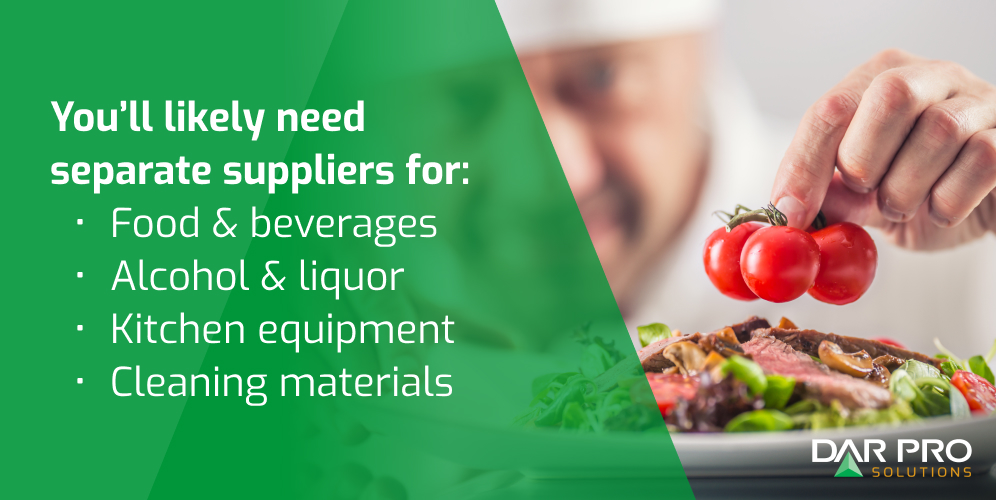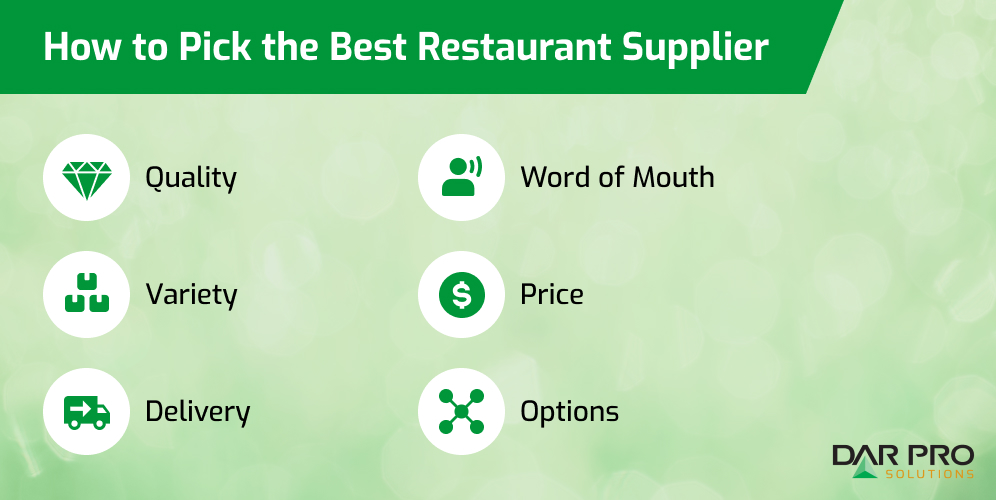Why Food Vendors for Restaurants are Important
Vendors are responsible for delivering food and other essentials to your restaurant. Once the food has arrived, the kitchen can prepare, cook, and serve it. This process sounds like the basics of how a restaurant works, and it is!
This process is why restaurant suppliers are so important. Without them, the basics of restaurant operation would fail. Just as restaurants vary from each other, no two restaurant food suppliers are the same. Choosing the right one for your business is vital to your success.
How to Pick the Best Restaurant Supplier
Choosing suppliers for your restaurant may seem daunting. There is no denying that picking suitable suppliers requires time and research. However, it's an excellent opportunity to build relationships and find ways for your business to run as efficiently as possible. You can save some money along the way too.

Know What You Are Looking For
Before reaching out to representatives, figure out what you need for your restaurant and menu. A steakhouse will have different needs than a vegan restaurant, just like a sit-down restaurant will have different needs than an efficient drive-thru.
It would help if you also prioritized the wants and needs of your restaurant. What are the "non-negotiables" and highest priorities, and what can you forego or adjust accordingly when the budget gets tight? If you’re starting a new restaurant, it's unlikely to get everything you want.
Limitations will apply to ingredients' quality and quantity. However, it will also demonstrate whether or not your restaurant's priority is sustainable or cost-effective. Evaluate the food supply a vendor offers and what nonfood supplies they provide, if any.
If you run a kitchen, you’re going to have to do something about grease and used cooking oil. Knowing the different ways to dispose of the material and equipment needed is key. Enter grease traps and grease containers.
Grease containers are sustainable and convenient options for fryer oil disposal, whereas grease traps are required for most all kitchens and are connected to your drains and plumbing. They need to be installed and regularly cleaned to follow municipality law.
Read more: Grease Trap vs. Grease Container: What’s the Difference?
Number 1: Quality
What is the quality of the product the supplier offers? Quality matters, both in the product you receive and the people who play a part in providing it. Quality ingredients directly translate to better quality food, which every restaurant desires.
Keep in mind that a vegan restaurant that claims to have all local, organic ingredients will be held to higher standards in terms of ingredient quality than a fast food restaurant might be. The best restaurant supplies for each will vary. Which restaurant supplier is most suited for your establishment?
There's no need to commit blindly to one restaurant supplier. Once you've narrowed your search to a few food vendors, ask for samples to test the food's quality and taste. Food samples help to further your decision-making process.
When choosing restaurant suppliers, the hope is to develop a long-term relationship. Ideally, you want good-quality people behind the operation. You will frequently interact with them to place orders, receive deliveries, and communicate if you need additional products or if any product is currently unavailable. If the food distributor and delivery driver(s) are good communicators, the day-to-day will run more smoothly.
Purchasing the right equipment is also critical to the successful operation of your restaurant. Each piece of commercial kitchen equipment is a long-term investment.
Read more: Top Things to Know When Purchasing Restaurant Equipment
Number 2: Variety
Realistically, restaurants are going to need more than one supplier. You'll likely have more than one vendor to get all your required products. On top of that, you'll want a few backup suppliers in case your primary supplier is temporarily out of a product or there is a delay in their supply chain.
Some large suppliers offer everything a restaurant might need. They may be a good option for restaurants that need bulk products and have lots of storage for food items and cleaning products. Local suppliers may be more conducive and better business partners for smaller restaurants.
Does the vendor provide products other than food, such as restaurant equipment or decor? Evaluate whether or not their offer aligns with your restaurant's concept and menu.
You'll likely have separate suppliers for food and beverages, alcohol and liquor, kitchen equipment, cleaning materials, etc. Check to see if a vendor offers a wide range of products that match what you would like to purchase. Some restaurants will need more options than others or a wider variety of a specific type of product.
For example, when it comes to used cooking oil collection equipment and grease containers, there is no one size fits all. Consider a provider that has a diverse selection of options to fit your kitchens footprint. Then, ask the question: Which container is right for me?
Read more: What to Consider When Selecting a Used Cooking Oil Storage Tank

Number 3: Delivery
How quickly can the supplier deliver to you, and what is the delivery schedule? Remember, the longer the food spends in the transportation phase, the less fresh it will be when it arrives at your restaurant.
It is also good to ask where their warehouse is and where they source the food to get an idea of the commute radius. You can even ask for a tour of their warehouse. A tour is a great way to see how far the warehouse is from your location, how clean and organized it is, how food products are packaged and stored, and if they follow food safety protocols.
To get an idea of whether or not they may be someone you'd like to work with, ask about the delivery schedule and how often they deliver to see if that schedule works with your restaurant's plan.
Number 4: Word of Mouth
Even with the endless amounts of information on the internet, word of mouth and recommendations can still be highly informational and influential. Focus on talking to other restaurant owners with a similar concept to yours.
Who do they use? What are the positives and negatives in their experience with their restaurant supplier thus far?
Remember, when looking for recommendations, these are just recommendations that you can choose to take or leave. Each restaurant will have unique needs; remember what those are for your restaurant.
Number 5: Price
No matter what industry you are in or how large your budget is, price is a significant factor in any business decision. Compare the prices of different restaurant suppliers you are considering. Determine which suppliers check most of your boxes while maintaining an affordable price.
Once you are down to a few options, feel free to negotiate with them. You may get an even better deal. Remember to go back to your priority list to know what you are willing to spend a little extra on and what can save you money.
Number 6: Options
Options you may receive from a restaurant supplier include kitchen equipment, dishware, and cleaning equipment. You want your restaurant to run as smoothly as possible from start to finish. You'll want to nurture a good relationship with your supplier so that when you need something new, something replaced, or something serviced, you'll have someone to go to directly.
When starting a new restaurant, there will also be a handful of one-time purchases. You'll require a lot of larger kitchen equipment and storage for the initial setup of the establishment. You can purchase these through suppliers or secondhand.
DAR PRO Solutions provides equipment that makes the kitchen clean-up process quick and painless and gives you the best solution to your greasy messes at the end of the day. Check out our used cooking oil containers and find out which option is best for your restaurant.
View used cooking oil container options: Indoor and Outdoor Automated Systems

Choosing the Right Restaurant Equipment and Services
There are many things to consider when choosing a restaurant supplier, especially with all the options available. Communicate your needs, and don't be afraid to take your time in the research phase. A well-researched decision may take time initially but will save you money in the long run.
Do you still have questions? DAR PRO Solutions is happy to help. We're proficient in reducing labor costs and food waste. Ask us how today.
Read more: How to Avoid Choosing the Wrong Grease Service Partner
DAR PRO Solutions provides safe and efficient used cooking oil recycling solutions to over 225,000 commercial kitchens across the country. Our innovative equipment solutions, strong customer support, and service expertise will make handling grease a worry free part of your business. Reach out to a DAR PRO representative today and find out how your business can benefit from our program. Call us 24/7/365 at 855-DAR-PRO1 (855-327-7761).
Contact Sales
For customer service inquiries call our toll free number (855) 327-7761
By submitting this form I agree to the privacy policy including the usage of contact details to contact me for marketing purposes.
